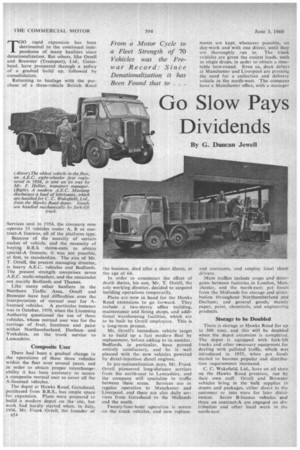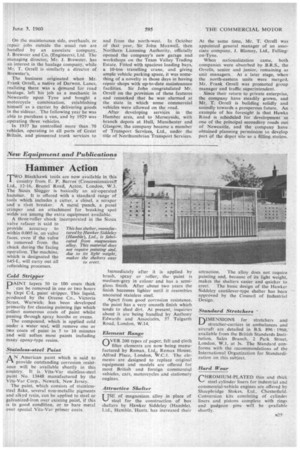WIRMmor Go Slow Pays
Page 70

Page 71

If you've noticed an error in this article please click here to report it so we can fix it.
Dividends
TOO rapid expansion has been detrimental to the continued independence of many hauliers since denationalization. But others, like Orrell and Brewster (Transport), Ltd., Gateshead, have prospered through a policy of a gradual build up, followed by .consolidation.
Returning to haulage with the purchase of a three-vehicle British Road Services unit in 1954, the company now operate 33 vehicles under A, B or contract-A licences, all of the platform type.
Because of the scarcity of certain makes of vehicle, and the necessity of buying B.R.S. throw-outs to obtain special-A licences, it was not possible, at first, to standardize. The aim of Mr. T. Orrell, the present managing director, is heavy A.E.C. vehicles and Bedfords. The present strength comprises seven A.E.C. multi-wheelers, and the remainder are mainly Bedfords and Thames.
Like many other hauliers in the Northern Traffic Area, Orrell and Brewster have had difficulties over the interpretation of normal user for Alicensed vehicles. A particular instance was in October, 1959, when the Licensing Authority questioned the use of three vehicles, whose normal user was for the carriage of fruit, furniture and paint within Northumberland, Durham and Yorkshire, on the trunk service to Lancashire.
Composite User
There had been a gradual change in the operations of these three vehicles within the fleet over several years, and in order to obtain proper interchangeability it has been necessary to secure a composite normal user to cover all the A-licensed vehicles.
The depot at Hawks Road, Gateshead, purchased from B.R.S., has ample space for expansion. Plans were prepared to build a modern depot on the-site, but work had hardly started when, in July, 1956, Mr. Frank Orrell, the founder of
e24 the business, died after a short illness, at the age of 64.
In order to counteract the effect of death duties, his son, Mr. T. Orrell, the sole working director, decided to suspend building operations temporarily.
Plans are now in hand for the Hawks Road extensions to go forward. They include a two-storey office building, maintenance and fitting shops, and additional warehousing facilities, which are to be built by Orrell employees. This is a long-term project.
Mr. Orrell's immediate vehicle target is to build up a fast modern fleet by replacement, before adding to its number. Bedfords, in particular, have proved entirely satisfactory, and he is well pleased with the new vehicles powered by direct-injection diesel engines.
In pre-nationalization days, Mr. Frank Orrell pioneered long-distance services from the north-east to Lancashire, and the company still specialize in traffic between these areas. Services are in regular operation to Manchester and Liverpool, and there are also daily services from Gateshead to the Midlands and the south.
Twenty-four-hour operation is severe on the trunk vehicles, and new replace
ments are kept, whenever possible, on day-work and with one driver, until they are thoroughly run in. The trunk vehicles are given the easiest loads, such as single drops, in order to obtain a timetable turn-round. Even so, dock delays at Manchester and Liverpool are pressing the need for a collection and delivery vehicle in the north-west. The company have a Manchester office, with a manager and assistants, and employ local shunt drivers.
Main traffics include soaps and detergents between factories in London, Manchester, and the north-east: pet foods from the Midlands for storage and distribution throughout Northumberland and Durham; and general goods, mainly paper, paint, chemicals, and engineering products.
Storage to be Doubled
There is storage at Hawks Road for up to 300 tons, and this will be doubled when the depot extension is completed. The depot is equipped with fork-lift trucks and other necessary equipment for dealing with palleted traffic, which was introduced in 1955, when pet foods started to become popular and distribution requirementS increased.
C. C. Wakefield, Ltd., have an oil store on the Hawks Road premises, run by their own staff. Orrell and Brewster vehicles bring in the bulk supplies in drums and packages, either direct to the customer or into store for later distribution. Seven B-licence vehicles and three on contract-A are engaged on distribution and other local work in the north-east. On the maintenance side, overhauls, or repair jobs outside the usual run are handled by an associate company, J. Brewster and Co. (Engineers), Ltd. The managing director, Mr. J. Brewster. has an interest in the haulage company, while Mr. T. Orrell is similarly a director. of Brewster's.
The business originated when Mr. Frank Orrell, a native of Darwen, Lanes, realizing there was a demand for road haulage, left his job as a mechanic in Newcastle upon Tyne and bought a motorcycle combination', establishing himself as a carrier by delivering goods in the sidecar. The following year he was able to purchase a van, and by 1929 was operating three vehicles.
In 1937 he controlled more than. 70 vehicles, operating to all parts of Great Britain, and pioneered trunk services to and from the north-west. In October of that year. Sir John Maxwell, then Northern Licensing Authority, officially opened the company's new garage and workshops on the Team Valley Trading Estate. Fitted with spacious loading bays, a 10-ton travelling crane, and giving ample vehicle parking space, it was something of a novelty in those days in having repair shops with up-to-date maintenance facilities. Sir John congratulated Mr. Orrell on the provision of these features and remarked that be was alarmed at the state in which some commercial vehicles were allowed on the road.
After developing serviCes in the Humber area, and to Merseyside, with branch depots at Hull, Manchester and Glasgow, the company became a member of Transport Services, Ltd., under the title of Northumbrian Transport Services. At the same time, Mr. T. Orrell was appointed general manager of an associate company, J. Blarney, Ltd., Fellingon-Tyne.
When nationalization came, both companies were absorbed by B.R.S., the Orrells, senior and junior, remaining as unit managers. At a later stage, when the north-eastern units were merged, Mr. Frank Orrell was promoted group manager and traffic superintendent.
Since their return to private enterprise, the company have steadily grown, and Mr. T. Orrell is building solidly and soundly towards a prosperous future. An example of his foresight is that Hawks Road is scheduled for development -as one of the principal secondary roads out of Newcastle, and the company have obtained planning permission to develop part of the depot site as a filling station.
















































































































